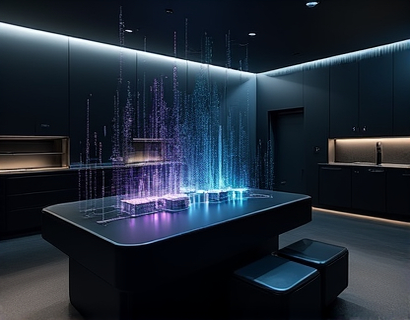Unlock Real-Time Engagement: Transforming Live Communication with Advanced AI Avatar Technology
In today's fast-paced digital landscape, effective communication is more crucial than ever. Businesses and content creators are constantly seeking innovative ways to engage their audiences, and advanced AI avatar technology is at the forefront of this transformation. By harnessing the power of lifelike avatars, organizations can elevate their presentations and virtual events, creating dynamic, real-time interactions that captivate and inform. This article explores the impact of AI avatar technology on live communication, highlighting its benefits, applications, and the future of digital engagement.
The Evolution of Digital Communication
Digital communication has evolved significantly over the past few decades. From simple text-based emails to immersive video conferencing, the way we connect has transformed dramatically. However, traditional methods often fall short in delivering engaging and memorable experiences. This is where AI avatar technology comes into play, offering a new dimension to communication that combines visual appeal with interactivity.
What Are AI Avatars?
AI avatars are digital representations of individuals that utilize artificial intelligence to simulate human-like interactions. These avatars can be designed to resemble real people or can take on entirely unique forms. They are capable of delivering messages, responding to audience queries, and engaging in conversations, all in real-time. The technology behind AI avatars includes natural language processing, machine learning, and advanced graphics, enabling them to communicate effectively and convincingly.
Benefits of Using AI Avatars in Communication
Integrating AI avatars into communication strategies offers numerous advantages:
- Enhanced Engagement: AI avatars provide a visually appealing and interactive way to present information, capturing the audience's attention more effectively than traditional methods.
- Real-Time Interaction: With the ability to respond instantly to audience input, AI avatars create a dynamic communication environment that fosters engagement and participation.
- Personalization: AI avatars can be customized to reflect the brand's identity or the speaker's personality, making the communication more relatable and impactful.
- Scalability: AI avatars can be deployed across various platforms and events, allowing businesses to reach larger audiences without compromising the quality of interaction.
- Cost-Effectiveness: By reducing the need for physical presence, AI avatars can lower travel and logistical costs associated with live events.
Applications of AI Avatar Technology
The versatility of AI avatars makes them suitable for a wide range of applications:
1. Virtual Events and Webinars
AI avatars can serve as hosts or presenters in virtual events and webinars, delivering content in an engaging manner. Their ability to interact with attendees in real-time enhances the overall experience, making it more memorable and impactful.
2. E-Learning and Training
In the education sector, AI avatars can act as instructors or facilitators, providing personalized learning experiences. They can adapt their teaching style based on student responses, ensuring that learners remain engaged and motivated.
3. Customer Support
AI avatars can be integrated into customer support systems, providing instant assistance to users. They can answer frequently asked questions, guide customers through processes, and even handle complex inquiries, all while maintaining a human-like interaction.
4. Marketing and Advertising
In marketing, AI avatars can be used in promotional videos, social media campaigns, and interactive advertisements. Their ability to convey messages in a relatable manner can significantly enhance brand awareness and customer engagement.
5. Telehealth and Remote Consultations
In the healthcare industry, AI avatars can facilitate telehealth consultations, providing patients with a more personal experience. They can guide patients through the consultation process, ensuring that all necessary information is communicated effectively.
Creating Lifelike AI Avatars
The creation of lifelike AI avatars involves several key components:
1. Design and Animation
The visual design of an avatar is crucial for its effectiveness. High-quality graphics and realistic animations are essential to create an engaging character that resonates with the audience. This includes attention to facial expressions, body language, and overall appearance.
2. Natural Language Processing
Natural language processing (NLP) enables AI avatars to understand and respond to human language. This technology allows avatars to engage in meaningful conversations, making interactions feel more authentic and personal.
3. Machine Learning
Machine learning algorithms help AI avatars improve their responses over time. By analyzing user interactions, avatars can learn from past experiences and adapt their communication style to better meet audience needs.
4. Voice Synthesis
Voice synthesis technology allows AI avatars to speak in a natural and engaging manner. By using advanced voice modulation techniques, avatars can convey emotions and tone, enhancing the overall communication experience.
Challenges and Considerations
While AI avatar technology offers numerous benefits, there are also challenges to consider:
1. Ethical Concerns
The use of AI avatars raises ethical questions regarding authenticity and representation. It is essential to ensure that avatars are used responsibly and do not mislead audiences.
2. Technical Limitations
Despite advancements in technology, there are still limitations in creating fully lifelike avatars. Issues such as latency, voice recognition accuracy, and animation fluidity can impact the overall experience.
3. Audience Acceptance
Not all audiences may be receptive to AI avatars. Understanding the target audience and their preferences is crucial for successful implementation.
The Future of AI Avatars in Communication
The future of AI avatars in communication looks promising. As technology continues to advance, we can expect even more lifelike and interactive avatars that enhance engagement and communication. Here are some trends to watch:
1. Increased Personalization
Future AI avatars will likely offer even greater levels of personalization, allowing users to customize avatars to reflect their unique identities and preferences.
2. Integration with Augmented and Virtual Reality
The integration of AI avatars with augmented and virtual reality technologies will create immersive experiences that blur the lines between the digital and physical worlds.
3. Enhanced Emotional Intelligence
Advancements in emotional AI will enable avatars to recognize and respond to human emotions more effectively, creating deeper connections with audiences.
4. Broader Adoption Across Industries
As the technology matures, we can expect broader adoption of AI avatars across various industries, from entertainment to healthcare, further revolutionizing communication.
Conclusion
Advanced AI avatar technology is transforming the landscape of live communication, offering businesses and content creators innovative solutions to engage their audiences. By providing lifelike, interactive experiences, AI avatars set a new standard for digital communication. As we continue to explore the potential of this technology, it is essential to address the challenges and ethical considerations that arise. The future of communication is here, and it is powered by advanced AI avatars that unlock real-time engagement and create unforgettable experiences.












